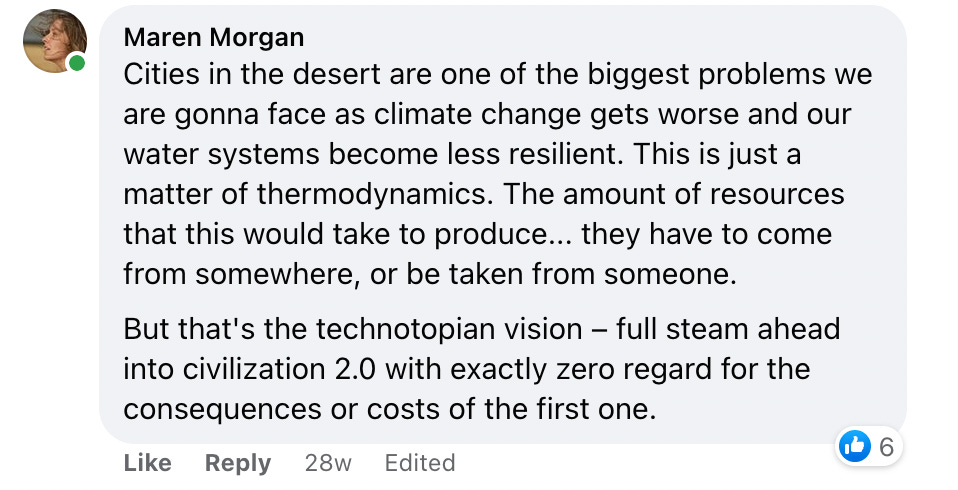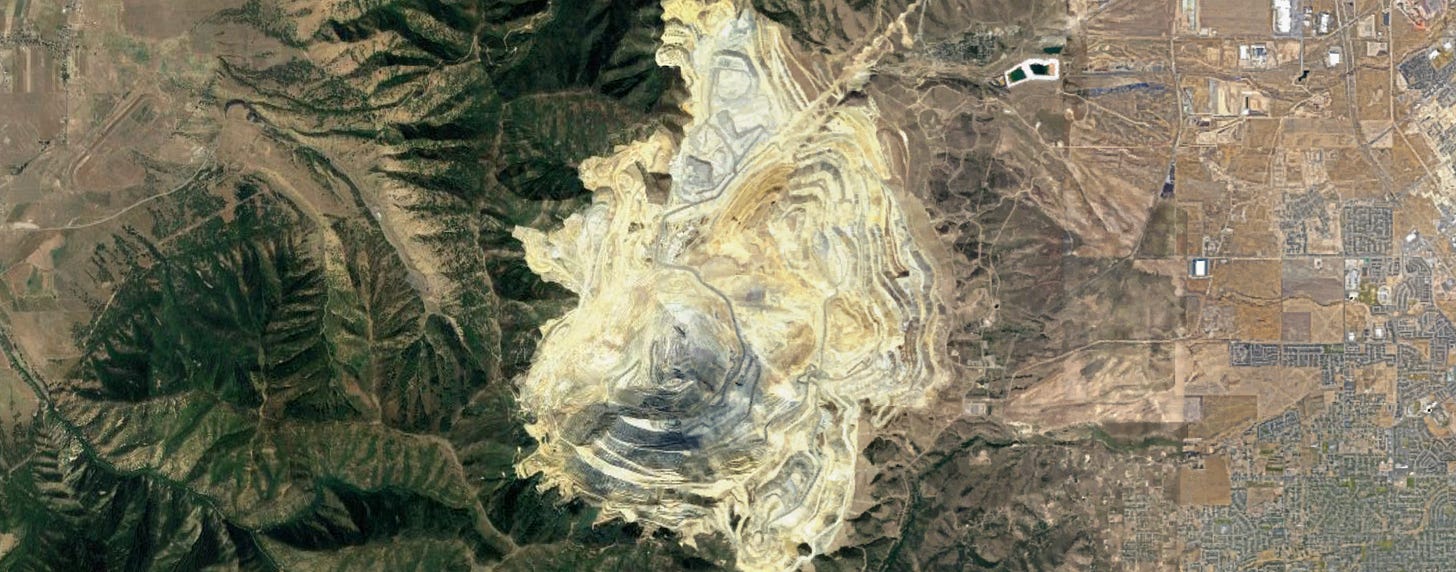Undomestication, Abstinence & Technotopianism, and the Cost of "Imagination"
Including Wild Quetzal, Juan Pablo Gutierrez, and more!
#33 Wild Quetzal - Viewing Food as a Lifeway & the Undomestication of Humanity
This week we had the honor to talk with Wild Quetzal — whom some of you may know from Instagram where he is making incredible content about food sovereignty, ancestral lifeways, wildness, and reconnecting with nature. Quetzal is also masterfully crafting posts that encapsulate so much of what we are trying to convey with our project. For example:
“Our lack of relationship with death creates a culture that still is a byproduct of death but instead outsourced it out of sight rather than face it head on.
Our clothes, our devices, our food & our life require death. Yet for a society so sheltered and insulated, that is never seen, never experienced and presumed to be nonexistent.
Rather than fear this natural process, how about we strive to understand and develop a healthy and sacred relationship with that which feeds life.”
Quetzal is breaking down incredibly dense and complex topics, such as civilization, its genesis, and its impact on the world, into entertaining videos and infographics, making these important topics incredibly accessible to a wider population. The work is absolutely fantastic, and we had a blast talking with him.
You’ll definitely want to click on this one:
We hope you enjoy this episode, and please give Quetzal a follow.
Abstinence and Technotopianism
There generally seems to be two camps when it comes to environmentalism. I am sure there are many out there who don’t fit neatly into these camps and I personally know quite a few. But to be general, I see two main camps. The Abstinence camp, and the Technotopian camp.
It seems when people become aware of the environmental situation we are in, they flock to one side of what I believe is the same coin.
The Abstinence advocates are the believers in consuming less, having less children, traveling less, doing less, eating lower on the food chain, etc. The Technotopians proclaim, “Innovate! Science and Technology will save us!” Only by getting richer and ‘smarter’ can we resolve the deranged environment.
These two camps duke it out in books, blog posts, podcasts, lectures, rallies so on and so forth. And both are right in some regards. We have, after all, been able to (for the moment) produce more food with less land thanks to technology and science. While on the other hand, that is only possible through the extraction and implementation of fossil fuels, fossil water, potassium, and phosphorus onto dead soil. The Abstinence crowd will point out that this is a temporary illusion and the Abstinence Program has been right all along. Meanwhile, the cornucopians believe we haven’t stumbled upon the next great invention that will feed the world and provide endless energy… all the while sucking the carbon out of the atmosphere and sweeping it under the rug.
The more I look at the past century of “Environmentalism”, if we can call it that, the more I see these two camps as one-in-the-same. They really have more in common than they think. Less growth, no, more growth.
But my question is, from what point are we moving?
The starting point of more or less growth seems to be a handful of assumptions: two of which are, again, two sides of the same coin are that humans are inherently flawed (Abstinence) and our special uniqueness (Technotopia). Our flawed-ness has driven a divide between us and the rest of the world, and therefore the rest of the world is called the “environment,” something outside ourselves that needs saving, from ourselves, and our uniqueness has given us dominion and right to utilize the also equally separate and distinct “environment” that is below us and full of resources that must be sustainably managed but in the end used to our own devices.
The abstinence crowd, at first glimpse, and to my younger self, seemed obviously correct: humans are a plague to the earth, we are a virus, bacteria in a petri-dish bound to consume the available resources and eventually ourselves. My angry self-righteous and pathetically human-despising 17-year-old brain relished in this explanation of the world. The nexus of evil was us and it felt good. We deserved to go extinct. The mammoths had the final laugh. But that view is only available to someone with limited reasoning and lack of historical awareness and cultural understanding. No time for a proper breakdown of this here but I do think it is sufficient to say that 80% of the world's biodiversity resides in “environments” inhabited by indigenous peoples.
Ultimately, the Abstinence crowd seems to not be paying much attention to human nature or, more precisely, don’t understand it. The biggest societal abstinence programs in the world have been the United States sex abstinence program, the War on Drugs, D.A.R.E, and other punitive programs to uncivilized behavior.
“Just don’t do it. Good law abiding citizens don’t do those things.”
Drug abuse and teen pregnancies are the highest in the countries/states that have abstinence programs. The abstinence program fails to take into account why the behavior takes place. Well, on second thought, it just assumes we are flawed and our system of civil law saves us from ourselves through fear and punishment. And the irony is that most people who use drugs are highly traumatized from the fear and punishment they experienced in life. If we think that telling someone if they use drugs they will go to jail, will make them stop using drugs, then the assumption is that people use drugs because they don’t fear the repercussions or they don’t understand that they should be afraid of the drugs. But in the words of Gabor Maté, “Drugs are not the problem, they are your attempt to fix the problem”. Under a certain light, Fossil fuels are not the problem, they are our attempt to fix the problem. Consumption is not the problem, it is our attempt to fix the problem.
Well then, what is the problem? If the assumption of the Abstinence crowd is humans are inherently flawed and we should abstain to the best of our ability from our flawed-ness (greed, destruction, consumption, competition, power etc.) then we are doomed to follow the same trajectory that the War on Drugs has followed for the past few decades: A giant colossal failure and waste of money. On a personal note, as a child of the 90’s and 2000’s, despite my governments efforts I have consumed a myriad of drugs. Despite Nancy Reagan and that fat bald cop who searched my locker and told me “acid would scramble my brain.” So has generally everybody I know. I also remember that in my health class in high school, during the period in which abstinence was being taught to us, my fellow classmates used the fantastic wisdom imparted upon us to get pregnant at the ripe old age of 16. For those of you whom abstinence from sex and drugs worked, congrats, the feeling of patting yourself on your back must feel great. But to those of us incapable of abstaining from our inherent flawed-ness… where does that leave the general public of the world? As it is my personal conviction that most people have sex and do drugs… at least a little.
So, in a world, literally and figuratively on fire, what do we do with a bunch of monkeys who just can’t abstain? While most people aren’t addicted to drugs, I do find the analogy of modern industrial civilization to the drug addiction epidemic well suited. We can create all sorts of policies, run environmental D.A.R.E programs that scare enough people from not driving their car to the next family gathering and starving their children of nutrition for Meatless Mondays. But the likelihood of it actually doing anything has, as of late, done little to nothing. I mean just go outside: erryone drivin’ a car. That shit ain’t stopping. As long as our literal survival rests upon us driving to and from where we work to pay for the food that was driven to us in our boxes heated and lit with oil we are gonna keep burning it. And that’s okay, we legit don’t have an option. There is no amount of abstinence you can do as a modern human whom has an electrically powered device whom is reading this piece of writing, that could actually make a meaningful effect on saving the “environment” (if you don’t believe me, play a mind game with me and think about the device you are reading this with, think about the industries and subindustries that make the glue that holds the machine together that makes the machine that makes one of the hundreds of tiny components that make up your device that you will only own for a handful of years).
Like the drug addict who has lost everything and who’s best option is to up the dose and chase that dragon, we, too, as a civilization, have hit rock bottom. The Russian invasion has presented a little bit of a conundrum to the environmental movement: geopolitics. In a matter of days, the Western countries, on their path to sustainability, started buying up oil and have plans to drill up extravagantly more. Fear changes our morals pretty quick. For every inch forward in the environmental movement an authoritarian leader gains 100 yards. Just like the addict who needs just one more hit before the holidays with the family, so too must we keep pumping and burning. “Just a little longer,” we tell ourselves. Just one less socia-authori-commu-tarianist leader with nukes and we can get ourselves clean, but until then burn that sweet tar and throw some solar panels and nuclear energy in there while you’re at it.
And on the other side of the coin, our specialness, our stature on the higher order of cosmic importance. The Technotopians tell us that we are a species that is so smart and amazing and we are literally created by the world so as to make it better and, more importantly, in our image, as in for our needs. All the other life and “resources” are here for us to do as we please and the environmental catastrophe is only humanity taking its first awkward baby steps on our way to the stars.
Intelligence is a funny topic. We deem ourselves the most intelligent by the standards we ourselves have set. Think for a moment like a cheetah. Let’s pretend the cheetah’s self-measured intelligence is in accordance to how fast one can move across the ground with nothing but its feet. Well… in this regard humans are dumb as fuck. And if there was a “universal intelligence test” set by, well, the universe, I would imagine the test goes as follows: A+’s go to the species that can support the ecological niche that support the very foundation of its sustenance and survival in a manner that is self replicating, resilient, perpetual and could last infinitely, sans a natural disaster such as an asteroidal impact. If that were the test, the test that the rest of the web of life seems to have mastered and carried out for billions of years, sans asteroidal impacts, we (modern/Western/‘Enlightenment’ culture) have failed, but tell ourselves we are passing splendidly.
In the words of one of those Roman philosophers:
“They plunder, they slaughter, and they steal: this they falsely name Empire, and where they make a wasteland, they call it peace.”
On our way to the stars we have indeed created a wasteland. On our way to the stars we must reinvent every wheel to bear our name. We are reinventing the same technology that over billions of years the earth perfected with brilliant elegance and sophistication. Take solar power for instance: of the astronomical amount of radiation that leaves the sun, a small fraction hits the earths atmosphere, of the amount that makes it through the atmosphere and doesn’t get reflected by ice and water, may chance upon something green, and when it does, the miracles of miracles happens. Photosynthesis. In an unimaginably clever, and efficient manner a free infinite source of energy is alchemised into almost every part of your life, to the food, clothes, gasoline, air, soil, amino acids, sugars, cellulose, plastics, all the living beings from flower, fungi, tree, frog, bear, birds, bacteria, apes, and insane drug addicted monkeys, essentially the source of life, sun light. The earth already invented solar power. And it’s perfect, glorious really, an uncountable number of biological organisms that represent a planet's amount of biomass come from solar power. Why reinvent it? There's a form of solar power that creates landscapes rather than disassemble them. Why have a shittier version of the thing?
Ultimately, these two camps have failed to address the climate problems. The Sixth Great Extinction rages on, inequality grows and grows, and the diseases of civilization multiply.
At the core of this coin, is an unchecked assumption. Defining that assumption is the art that will define our futures. After reading this, do you know what the assumption is? Sometimes I feel I know it, and sometimes it slips away. What is your assumption? I’d love to hear. There are an infinite amount of ways to understand and describe this assumption.
I’d like for you to watch a little video I have attached below. It is part of an interview we did with Juan Pablo Gutierrez. He is an activist from Colombia who is in exile from his country due to attempts on his life. He shares his story below and gives a great explanation of what his perspective tells him is at the center of the coin.
Why Do I Lack “Imagination”?
“We have now sunk to a depth at which restatement of the obvious is the first duty of intelligent men. If liberty means anything at all, it means the right to tell people what they do not want to hear. In times of universal deceit, telling the truth will be a revolutionary act.” — George Orwell, Facing Unpleasant Facts
A while back, I got into a bit of a row with a Facebook friend and old coworker. He was lusting about Telosa, a plan for a futuristic mega-city in the Nevada desert. I used to have a habit of engaging with people online, and I’m sure I’d be tempted back into that behavior if I was on Instagram and Facebook more often than I am. At this time, I felt the need to point out to him the dangers of investing in projects like this: where does the water come from for a massive city built in the middle of the desert, particularly as temperatures rise?
No, no, he assured me. The article says it’s “eco-friendly”. This is true: the article does indeed include the word “sustainable.”
“My question is,” I said, “ where do you think these resources come from? Who pays the true price for this utopian city? Is it the Bolivians who have poisoned waters for our lithium for the electric vehicles? Is it the Mexicans who can't get water because all of the Colorado river is diverted for this ‘eco-city’? Is it the dead children in the Congo mining cobalt for this technology? Where does the food come from?”
I told him nothing comes for free – these resources have to be extracted from somewhere. There’s no free lunch.
To which he replied:
If by “imagination” he means the same old story of progress and technology that has been regurgitated ad nauseam for hundreds of years, then I’ll agree, I lack it. The conversation further devolved and took a lot more of my energy than I’d care to admit to. My responses to his dismissal were, somewhat, justifiably crusty, but in retrospect, I don’t know if I’d change much of what I said. I called him out for this cheap departure from discussion, and he further said I was lacking imagination “beyond my own experience.” Anyway, I won’t pretend I was perfect in this exchange: my salty Martian side took a front seat and waged war.
“I just don’t believe in the religion of a technological fix to the problems of the world because I see absolutely zero evidence that the earth can sustain such a path, nor do I believe that this is the path that humans actually yearn for. When billionaires and corporations fully and enthusiastically agree with your vision for the future, there might be a problem.”
Another person chimed in, saying they are finishing their masters in water management, and agreed with me that the notion of “sustainable development,” especially in a desert, is absolutely untenable. My old coworker replied, to my misery, “Agree to disagree.”
Why do I point this dialogue (and my inability to let well-enough alone) out? My intention is less to make fun of my old coworker and more to illustrate the barriers between finding solutions that exist in reality versus the the so-called “solutions” that only exist in the world of fantasy and the imaginary, such as an implicit belief that something can be made from nothing. I won’t pretend that my intention here is not partially to put this type of thinking on blast: in my view, it is a dangerous way to see the world. The unflinching belief in progress, to the detriment of all else, is perhaps one of the more terrifying attitudes we must address when it comes to a topic as complex as this. My frustration, I think, is justified, even if my social tact isn’t.
But I’ll be more concrete as to why I lack this particular brand of “imagination.” It’s not just that I have “seen a movie about robots and AI taking over the world” and gotten spooked by this trajectory — it’s that the horrors of this trajectory are happening in real time, no sci-fi future necessary.
Ever since I began this project, I became a person that might not be very pleasant to be around. I’m not going to say I’m a “realist” because no one actually knows what that word means, but I am someone who has spent enough time digging through the weeds to know a thing or two about how deep their roots are. This may come across as “nay-saying” when my intention is actually to advocate for all that is missing from any grand, inflated idea of where we go from here. Some people would label that is “fatalistic” or even “nihilistic” — but I would tend to disagree. I think the truth gives us hope. It gives us hope because it implores us to actually do something about it. Even just speaking it aloud makes it a little more real, a little closer to a place where we can change things.
When I saw Telosa, I tried also to see the people of the Obi Islands whose drinking water is being poisoned with cancer-causing compounds to mine nickel for electric vehicles.
From above and below, I am trying to witness these people, and the plight of the Congolese who are essentially enslaved so we in the West can pretend that we are saving the world with an electric car.
I’m trying to see the world through the eyes of those forced to cut down their own sacred forests in Ecuador so Europeans can have “green” energy — forced because their waters are poisoned and the fish are dead so they are reliant on a colonial global food system that requires cash money.
It’s not popular to face the darkness and speak what you see, I know. It’s disruptive. It’s awkward. It’s depressing. People really don’t want to talk about it.
It’s also true. The popularity of these facts can’t change that.
It’s also true that I’m fucking angry about it. I’m angry about it all.
It’s a fact that I may be lambasted and hated for all that we say in this project. Oftentimes, it hurts to know this, that this looming, self-inflicted alienation will someday, at once, envelop me. The part of my heart that desperately wants belonging must be put on hold, for the rest of my soul refuses to bullshit myself and pretend that everything is okay when it isn’t. Unfortunately, I know what this shit costs now. I know the suffering that a place like Telosa will cause.
Still, in my sorrow of witnessing, I know that I do have imagination, a vision, a story I am looking to step into.
It’s just not this.

















"The part of my heart that desperately wants belonging must be put on hold, for the rest of my soul refuses to bullshit myself and pretend that everything is okay when it isn’t." Well, as you know, we are very welcome to belong in our ever-growing club of those who can no longer pretend everything is okay when it isn't. Or actually maybe that's you and Jake's club, and we're the members? Either way, glad we're in the same depressing club.